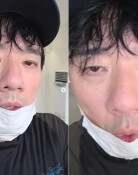Analysis of state affairs in crisis (2)
Leadership is uncoordinated
Analysis of state affairs in crisis (2)
Leadership is uncoordinated
Posted December. 01, 2000 14:59,
Analysis of state affairs in crisis(1) Reforming public corporations (2)
A leading personality in the ruling camp heaved a deep sigh Thursday, saying, ¡°Were you well last night?¡±, which has become a morning greeting again.
His sigh conveyed the sense of irritation perceived by the personalities in the ruling camp, who act as if working on thin ice of the current political landscape. They feel a dire need for some emergency measures to be done, but they are quite at a loss what to do first.
The lost sense of direction means that the control tower was out of order to work out and promote medium- and long-term policy goals, and coordinate Chong Wa Dae, the ruling Millennium Democratic Party (MDP) and the administration.
There are five channels of communications between Chong Wa Dae and the MDP: The party leadership and the chief presidential secretary, the MDP research office director and the president, the three-key party post holders' weekly briefings to the president, and an unofficial line of core inner-circle aides to the president.
The question is that the various levels of information briefings, policy reports and recommendations are made competitively. There is much half-baked information, unwarranted policies and some times conflicting information and policies, but there are no procedures to filter them, often leading to confusion in state affairs.
It is almost useless to expect the party¡¯s supreme council to play a role of policy coordination. This is mainly because the supreme councilors offer various opinions, but they have deferent viewpoints and conflicting political interests, making it almost impossible to achieve consensus.
Moreover, the coordinating functions between the government and the ruling party are vulnerable. This was well exemplified in their controversy over the legislation of a special law for the alleviation of farm debts. The government, at first, planned to take a special administrative measure in this regard, but it changed its policy to enact a special law on the heels of the farmers' massive, radical anti-government demonstrations, blocking the highways for hours Nov. 21. For that matter, even some MDP lawmakers criticized the development, saying that they are trying to close the barn door after the horse is stolen.
Similar is the case of the recent medical turmoil. It was four months later in October that the health-welfare minister began studying a program to raise the medical fees and the government subsidies for regional medical insurance institutions. By taking an impromptu step like giving a little milk to a crying baby to tame the disgruntled medical practitioners but often ended in failures.
In this process, two questions are raised. The government authorities had no accurate forecasts and analyses of the massive collective actions on the part of the farmers and the doctors. If the policy-making process is divided into two stages, input and output, the red signal was registered from the input.
The same goes for the output. The government was pushed around by the farmers and doctors, unable to forge related policy measures, though their demands were old and steadfast.
For another matter, there are many problems with the functions of monitoring and supervising the implementation process following policy decisions. This is to say that there were faults in the all three stages of forecasts of repercussions, policy-making and management.
Such being the case, it was argued that there is no control tower in the ruling camp. The presidential staff, under the present circumstances, fail to play an active coordination role, besides a liaison function between the administration and the MDP.
In this vein, voices are heard that now in the governing camp all men are running, meaning that the incumbents have yet to cast off the crust of the opposition party even three years after the seizure of power, in contrast with the previous ruling party in which any post holders functions as components of the one system.
The cabinet meetings and various other meetings have been held more frequently than under any other previous regime, the efficacy of the meetings is questioned. Without prior comprehensive studies and ample coordination pertaining to important policy matters for deliberation, their meetings are destined to end up with vague discussions, critics assert.
The lack of the state management system and control tower is cited as a major factor causing incompetent personnel governance.
Yoon Young-Chan yyc11@donga.com




![[김순덕의 도발] ‘李부터 연임’ 개헌, 이 대통령은 가능성을 말했다](https://dimg.donga.com/c/138/175/90/1/wps/NEWS/IMAGE/2026/01/16/133172656.1.jpg)


